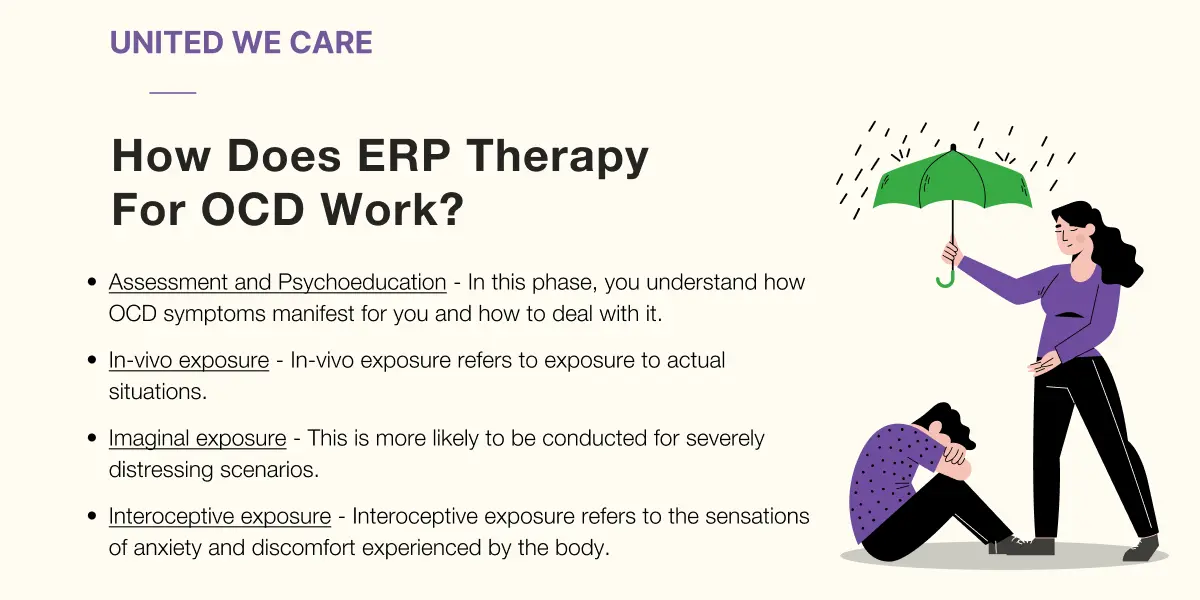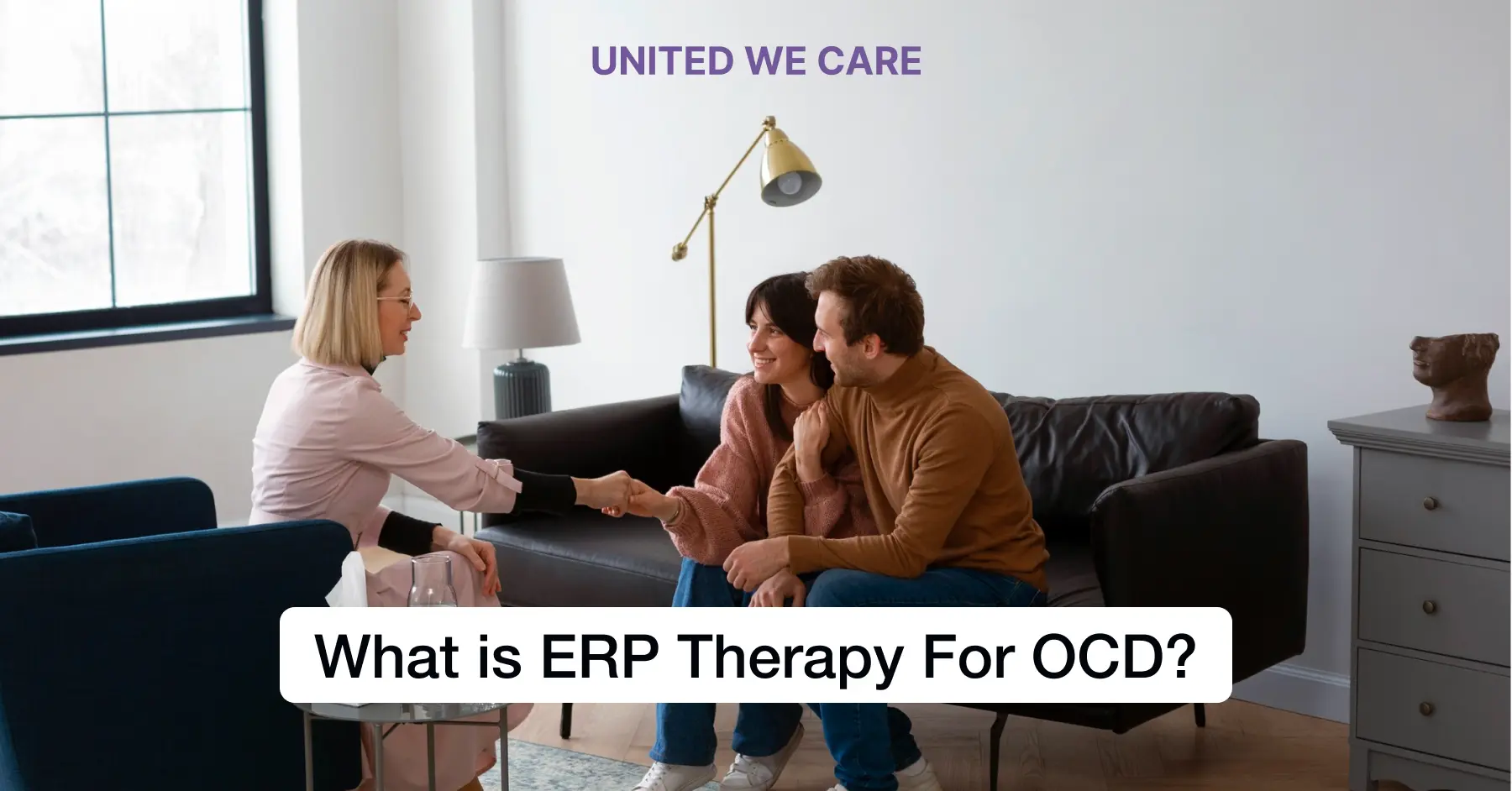Introduction
Ideally, ERP therapy is one of the most sought-after forms of psychotherapy in clinical practice. Psychotherapy refers to providing mental health care by a professional through structured conversations. There are several types of psychotherapies. A psychotherapist recommends ERP therapy in scenarios where other forms of therapy do not work.
Also, another reason for opting for ERP is higher evidence of effectiveness in specific conditions and disorders such as anxiety disorders and OCD. Due to the complexities of mental illnesses such Obsessive Compulsive Disorder or OCD, a comprehensive approach is required to understand why ERP is more effective than others.
What Is ERP Therapy?
Namely, ERP refers to Exposure and Response Prevention therapy. It is one of many forms of cognitive behavior therapy. Basically, exposure and response prevention refers to increasing the ability of an individual to prevent an automatic response of anxiety or fear when exposed to triggering stimuli. Within ERP, there are phases involving education to the patient about the condition, listing out triggers in a graded manner, etc.
Clearly, ERP works well for mental illnesses and conditions where a trigger in the environment induces anxiety or other reactions. This means that ERP therapy is effective for phobias, selective anxiety, and obsessive-compulsive disorder. In ERP, you do not remove the situation or the trigger. Rather, you practice reducing your anxiety associated with it in a safe environment.
What is ERP Therapy For OCD?
Specifically for OCD, ERP therapy has been found to be the most effective form of therapeutic intervention. Before diving into how ERP works for OCD, it is important to know what OCD entails. Obsessive Compulsive Disorder, popularly known as OCD, is a type of psychiatric illness. It is chronic in nature and requires both pharmacology and psychotherapy to manage the symptoms.
In OCD, an individual experiences obsessions with certain situations or items and associated compulsions. These compulsions include ritualistic behavior or actions that become essential to reduce obsessive thoughts. For most OCD patients, the compulsion to perform certain actions becomes necessary to get rid of the obsessive thoughts. Hence creating a distressing loop of obsessions and compulsions.
Without a doubt, this loop can have a significantly detrimental impact on a person’s functioning. To combat the impact on lifestyle and reduce the symptoms, ERP therapy is used. Through ERP, the patient learns to understand what causes the obsessive thoughts and gradually reduces them without the compulsive rituals.
Is ERP Therapy Good For OCD?
Firstly, ERP therapy consists of several ways to reduce the discomfort and anxiety caused by OCD for the patients. Its extensive effect on the thoughts, behavior, and other symptoms of OCD makes it the first line of treatment. You will find that most mental healthcare professionals advise undergoing ERP therapy for patients with OCD.
Secondly, the obsessions and anxiety associated with OCD do not develop over a day. Rather the symptoms gradually increase in intensity when you are not able to reduce the distress connected to the thoughts. This is also the cause behind the development of compulsions. Undergoing ERP helps the patient by learning to cope with the overall distress of the symptoms over time. This ensures that the symptoms do not get worse over time.
Thirdly, research points towards the efficacy of ERP therapy on the overall neurobiology of the patient. ERP therapy is based on the model of learning and extinction. Extinction refers to habituating the mind to let go of old learned memories and associated habits. The mechanism through which ERP therapy focuses on the learned compulsions of OCD helps impact the overall memory formation in the brain.
How Does ERP Therapy For OCD Work?
As mentioned above, ERP therapy employs a step-by-step approach to address the concerns you have for OCD. This includes working on the thoughts feelings in the body, and actual situations where symptoms related to OCD persist. To understand this in detail, let’s look at the different phases of the therapy.

- Assessment and Psychoeducation – In this phase, you understand how OCD symptoms manifest for you and how to deal with it. You create a list of all the possible triggers present, from the least distressing to the most distressing. This phase helps you in getting insights about the illness.
- In-vivo exposure – In-vivo exposure refers to exposure to actual situations. This is done under the supervision of the psychotherapist. You gradually expose yourself to low-distressing situations and practice response prevention.
- Imaginal exposure – This is more likely to be conducted for severely distressing scenarios. You are asked to imagine scenarios that lead to compulsions and learn to disconnect the stress and anxiety related to the scenarios.
- Interoceptive exposure – Interoceptive exposure refers to the sensations of anxiety and discomfort experienced by the body. Often, you will find that the obsessions lead to physical reactions. To combat this, working on exposure under safe conditions and supervision will reduce the physical symptoms.
Where Do I Find ERP Therapy For OCD?
Owing to the large group of specialties associated with healthcare, it can be difficult to find a specific format for therapy. You will need to be in the right setting and require the appropriate professional through your OCD treatment. Moreover, you will have to confirm the practitioner’s experience and hold on to ERP therapy for efficacy.
- Professional – ERP therapy is a form of psychotherapy that requires licensed psychotherapists or mental health practitioners. Preferably, look for practitioners with added certification or experience in dealing with OCD through Cognitive behavior therapies.
- Settings – Since OCD is a chronic illness, it is recommended to find healthcare providers who are available consistently and can be consulted over a long period of time. Preferably, look for hospitals or private clinics for quality care.
Finally, there are several modes of communication available, such as online, in-person, and telephone communication. It is important to follow recommendations made by mental health professionals for optimum care.
Conclusion
Overall, ERP therapy is a form of cognitive behavior therapy. It is considered to be the primary intervention for chronic psychiatric illnesses such as OCD. ERP therapy works by helping you confirm diagnosing and providing graded exposure to distress-causing triggers. To find healthcare providers with the right qualifications and extensive experience in ERP therapy for OCD, connect to United We Care.
References
[1] H. B. Simpson and D. M. Hezel, “Exposure and response prevention for obsessive-compulsive disorder: A review and new directions,” Indian Journal of Psychiatry, vol. 61, no. 7, p. 85, 2019, doi: https://doi.org/10.4103/psychiatry.indianjpsychiatry_516_18.
[2] C. Law and C. L. Boisseau, “Exposure and response prevention in the treatment of obsessive-compulsive disorder: Current perspectives,” Psychology Research and Behavior Management, vol. Volume 12, no. 1167–1174, pp. 1167–1174, Dec. 2019, doi: https://doi.org/10.2147/prbm.s211117.
[3] Obsessive-compulsive disorder : Core interventions in the treatment of obsessive-compulsive disorder and body dysmorphic disorder. Leicester: British Psychological Society And The Royal College Of Psychiatrists, 2006. Accessed: Dec. 17, 2023. [Online]. Available: https://www.ncbi.nlm.nih.gov/books/NBK56465.









